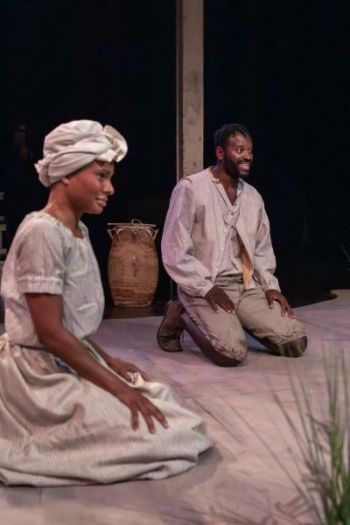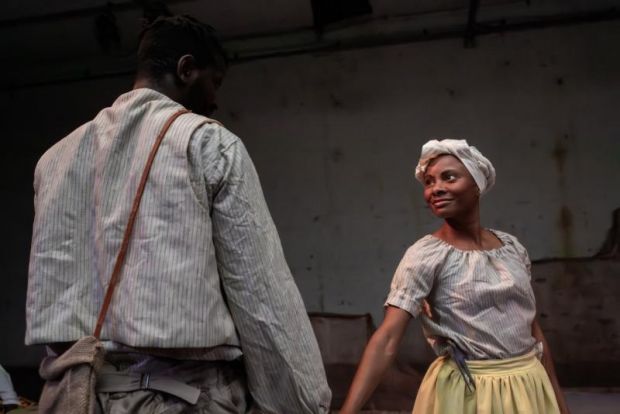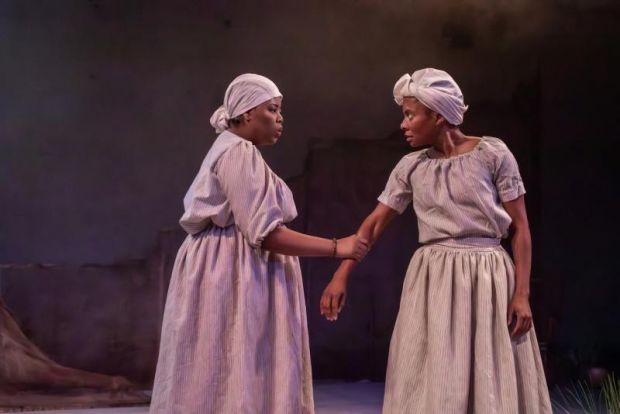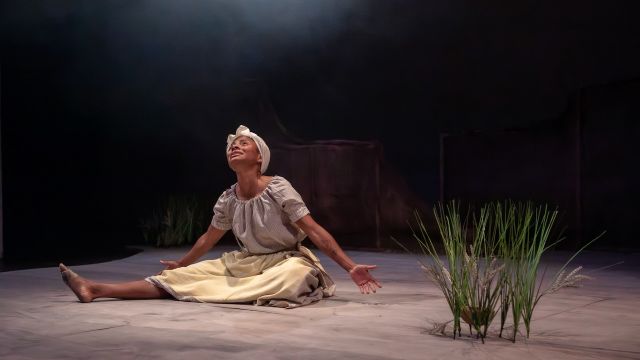Ilarun The Cutting Comb
Ilarun The Cutting Comb is a stunning amalgam of past and present, the divine and the profane, satire and poetry – and with music, dance, and drumming. Set in the 18th century, it digs into colonialism, slavery, and their twisted sexual roots. Via the play’s sly and canny language, we see that the business system, its product, and its marketing has not changed. Well, not that much.
 At fortyfivedownstairs, the show begins in the art gallery foyer with a sort of prelude that is sudden, loud, and confrontational. Hetty (Rufaro Zimbudzi), a tough, no nonsense street vendor, fends off importunate handyman Jabari (Alpha Kargbo) - until they’re interrupted by their white rulers, dimwitted Masa (David John Watson in white face, frock coat and wig) and his cunning, bullying, much-smarter-than-his-boss Assistant (Will Hall). Power relations made firmly clear, we are hustled downstairs to our seats in the usual playing space. Now we’re on an island – we guess - a generic colonial outpost, or a special part of that outpost called the Pussy Farm. And we meet Juicy (playwright Amarantha Robinson), a spirited, defiant woman who needs to, who must reconnect with her spiritual roots, her goddesses. In this hierarchical society – if ‘society’ is the word – there are those who resist and are punished for it, those who are cowed into submission, and there are those who benefit from collaboration. And of course, the ultimate beneficiaries, the colonials and slave owners. The revelation of the chief product and export (metaphoric or real?) of the Pussy Farm is only momentarily shocking – and then it makes perfect sense – as does the curious sexual hold the abused exploiter has over Masa, the white exploiter. An extraordinary performance from quicksilver Amarantha Robinson.
At fortyfivedownstairs, the show begins in the art gallery foyer with a sort of prelude that is sudden, loud, and confrontational. Hetty (Rufaro Zimbudzi), a tough, no nonsense street vendor, fends off importunate handyman Jabari (Alpha Kargbo) - until they’re interrupted by their white rulers, dimwitted Masa (David John Watson in white face, frock coat and wig) and his cunning, bullying, much-smarter-than-his-boss Assistant (Will Hall). Power relations made firmly clear, we are hustled downstairs to our seats in the usual playing space. Now we’re on an island – we guess - a generic colonial outpost, or a special part of that outpost called the Pussy Farm. And we meet Juicy (playwright Amarantha Robinson), a spirited, defiant woman who needs to, who must reconnect with her spiritual roots, her goddesses. In this hierarchical society – if ‘society’ is the word – there are those who resist and are punished for it, those who are cowed into submission, and there are those who benefit from collaboration. And of course, the ultimate beneficiaries, the colonials and slave owners. The revelation of the chief product and export (metaphoric or real?) of the Pussy Farm is only momentarily shocking – and then it makes perfect sense – as does the curious sexual hold the abused exploiter has over Masa, the white exploiter. An extraordinary performance from quicksilver Amarantha Robinson.
The program notes tell us that Ilarun is Part Two of a trilogy inspired by the trio of West African goddesses: Oshun, goddess of river waters, Oya, goddess of weather, and Yemija, goddess of the oceans. Robinson has already presented Oshun, her one woman show, to great acclaim.

Here she discovers for us unexpected layers, connections, and startling insights, conveyed by a cast of huge presence and energy. The dialogue juxtaposes black and white ways of speaking, and contemporary idiom with poetic and ritualistic language in deliberately jarring but illuminating ways.

If the characters are more types than characters, it is because the playwright seeks to reveal the suppression of the necessary spiritual, and the psycho-sexual underpinnings of colonialism and exploitation – and she succeeds. The true originality of Ilarun is supported and enhanced by the immersive collaboration of the so-called ‘creatives’: director Effie Nkrumah (so marvellous as an actor in the recent La Belle Epoque), designers Harry Gill and Rachel Nankin, choreographer Kwame Tosuma, and again more impressive work from composer Jack Burmeister. This show overturns and strips bare ‘white’ assumptions and patchy knowledge of ‘Africa’ and its history but does so in a gripping, witty and vastly entertaining way,
Michael Brindley
Photographer: Dre Chez
Subscribe to our E-Newsletter, buy our latest print edition or find a Performing Arts book at Book Nook.

